|
|
|
|
|
|
|
|
|
|
|
|
|
 |
 |
 |
 |
|
 |
 |
|
|
Boy Scouts FAQ  |  |  |  | |  |  |  |  | | All are welcome to contribute as much as they can as a uniformed leader, Committee Member, Merit Badge Counselor (MBC), or as an active parent.
As a Committee Member, you should be willing to attend monthly Committee Meetings and get involved in as much/little upcoming activities as you wish.
As a Merit Badge Counselor, you choose to provide counseling from 1 to many of the available 121 Merit Badges. YOU DO NOT need to be an "expert" to be a counselor, as the $4-5 handbooks will cover ALL that you need to know to learn/teach each particular badge.
As a Merit Badge Counselor, your time is ONLY used "upon request" when a Scout decides he would like to work on a particular badge for which you've agreed to be a counselor. Merit Badges are earned OUTSIDE of the weekly meeting, so Scouts meet with you ON YOUR SCHEDULE of availability.
All leaders MUST complete a BSA Adult Application, which requires you to provide your Social Security Number. A background check will be done by the Baltimore Area Council. If you do not provide your SSN, you will not be accepted as a leader. This is National BSA policy and not the policy of Troop 340. | |  |  | |  |  |  |  |  |  |  |  | |  |  |  |  | | The Troop charges an annual membership fee. At this time that is $100.
There will be modest "food charges" for each monthly camping trip or outing, and a charge each year if your son attends week-long Summer Camp (highly encouraged!).
Fund Raisers are held as needed to fund new equipment, and more elaborate camping destinations.
==================
The membership fee - helps to pay for annual registration, Boy's Life Magazine subscription, numerous awards, badges, pins, camp ground fees, and more. It usually is NOT enough for all expenses (see fund raising below).
==================
"Camping fee" is typically $10 each trip.
"Food cost" Each patrol creates their own menu for monthly camping trips and can decide to raise or lower this charge to align with their menu choices. TYPICALLY, this should be $10-$15 each trip.
==================
Summer Camp Fee - Week-long Summer Camp is a great experience, and we encourage Scouts to attend every year. The average fee is $360.
==================
Fund Raising - held as needed to supplement the cost of running the Troop. Covers new/replacement equipment (tents, stoves, cook gear, fuel tanks, etc), or to cover the cost of more elaborate camping destinations.
| |  |  | |  |  |  |  |  |  |  |  | |  |  |  |  | 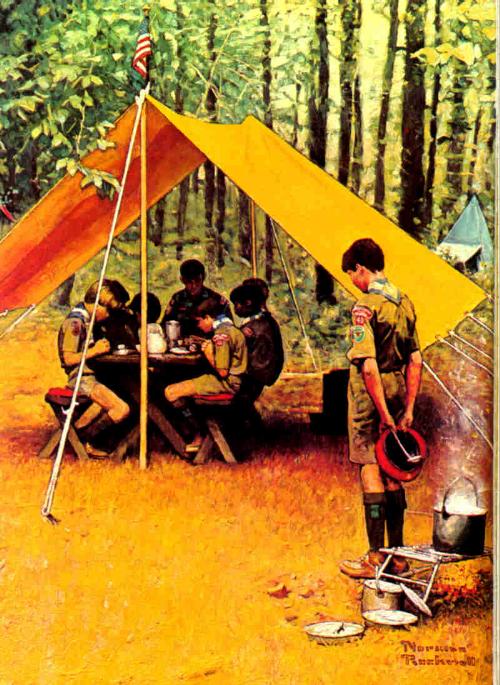 | Per the 12th point of the Scout Law, "a Scout is Reverent".
Scouting's founder, Lord Baden Powell, believed that it was crucial to the development of the "whole person" that we have a belief in, and love for, God and that we should live by and embody His laws and teachings.
Scouting does NOT promote any denomination above another and works with organized religions to offer awards (officially known as the Religious Emblem Program) to any boys choosing to further explore their religious faith, from Catholic, to Muslim, to Judiasm, to Budist. Again, Scouting proves itself to be SUPPORTIVE of diversity and religious differences.
However, as a Private organization, it is the right of the BSA to set a code or ethics and morals for its members to follow. Having a belief in God, is one of those criteria.
Those professing NO belief in God may find they would be better served in a different youth program than the BSA.
As we believe "being reverent" is such a critical part of Scouting, we openly pray during meals, at meetings, and during non-denominational "Scouts' Own" services which are held while we are away at camp. | |  |  | |  |  |  |  |  |  |  |  | |  |  |  |  | 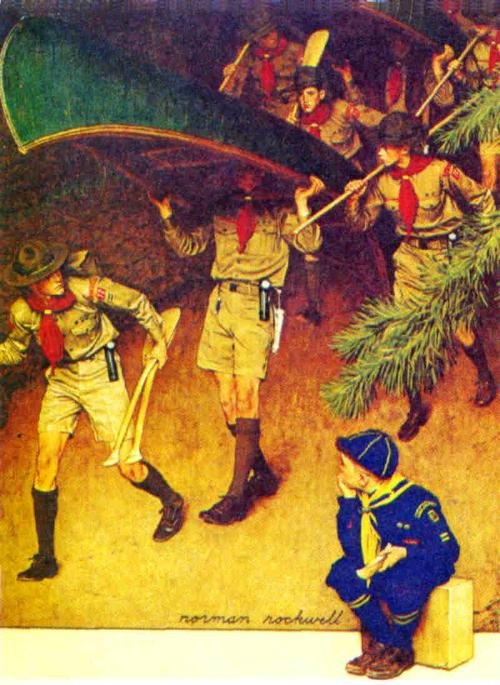 | The Boy Scouts of America Program is a 100 year old, professionally crafted, program of education and character development. By using the "Outdoor Method" (camping, fishing, rock climbing, etc) boys work together to do "the things boys like to do". In the process, they learn the value of teamwork, honesty, communication, mutual respect, and more as they work toward their goal and overcome any obstacles they encounter.
By employing the Methods of Scouting, we reinforce the AIMS of Scouting, which are reflected in our Oath and Law. The goal is to see that they become permanent fixtures in the character of each Boy Scout as we teach them to be Trustworthy, Loyal, Helpful, Friendly, Courteous, Kind, Obedient, Cheerful, Thrift, Brave, Clean, and Reverent. | |  |  | |  |  |  |  |  |  |  |  | |  |  |  |  | | Rank is an interesting word choice, clearly derived from Scouting's origin as a program modeled after a military structure.
Those holding a "higher rank" do not order around those of "lower rank". In Scouting, the term "rank" is a PERSONAL measure of his progress along the "Trail to Eagle"... or more appropriately thought of as his "trail to manhood".
When a boy joins Scouting, his first POSITION is "Scout".
He then works on the first 3 RANKS; Tenderfoot, 2nd Class, and 1st Class. Within the requirements of these ranks, a Scout learns the SAFETY aspects of Scouting; basic first aid, how to choose a safe camp spot, how to properly dress for an outing, how to find his way with map/compass, what to do if he gets lost, etc...
Now a demonstrated "safe" Scout... he is ready for his next period of personal development, which is LEADERSHIP. In the pursuit of Star, Life, and Eagle, a youth is learning (and then mastering) the skills of leadership. By holding leadership positions within the troop, he learns to lead, instruct, and inspire others. He learns to "give back" to others, and also learns his emerging place in Society as a citizen.
There are 121 various Merit Badges available (only 21 needed for Eagle). To ensure that the Scouts are getting a taste of the opportunities available, the higher badges of rank require a set number of merit badges be completed (including some designated as "Eagle required").
Merit Badges offer exposure to a diverse background of interests, adventures, and opportunities that Scouts may never experience IF NOT for the Scouting program (Aviation, Scuba, Reptile study, shooting sports, etc). It is not uncommon that exposure to a topic via the Merit Badge Program leads to life-long hobbies and career choices, as well as "needed skills" like Home Repair, Auto Mechanics, and Public Speaking.
There is no limit on the number of Merit Badges a youth may earn. | |  |  | |  |  |  |  |  |  |  |  | |  |  |  |  | | We won't send the "Scout Police" out to find you if you don't show up, but you miss out on a big part of the BSA Program if you don't attend regularly.
Scouting is NOT just playtime, or "Billy's weekend fun" away from his kid sister. Scouting is a carefully crafted character-development program. Each boy is a member of a PATROL, and as such, is part of a smaller group (as compared to the whole Troop of boys) where he is given AMPLE opportunity to play an active and valuable "hands on" role in the patrol's success. A boy who shows up sporadically DEPRIVES himself of the chance to make key decisions within his patrol; choose trip ideas and destinations, make menu selections, divvy out workload, and build close friendships. Every meeting includes a period of valuable skill instruction and fun inter-patrol competitions that relate to the upcoming camping trip. If a boys misses a meeting, he will find himself less prepared for the upcoming weekend in the outdoors. The troop meetings are where we "learn", but the camping trip is where we reinforce the skills by putting them into practical use.
Scouts should make every effort to attend meetings on a regular basis. Those who don't are missing out on the full experience of their limited Scouting years, and are causing their patrol members to do the same. | |  |  | |  |  |  |  |  |  |  |  | |  |  |  |  | | WHAT should you look for when you visit a troop? WHAT are some signs of a "good" unit? Keep these questions in mind... - How is the attendance? (low enrollment and/or attendance may indicate a troubled program.)
- Were the boys AND leaders in the proper uniform? (RUN from any troop that allows the "blue-jean brigade", where they are only in uniform from the waist up. If they don't promote the basic uniform, rest assured that OTHER THINGS are missing too.)
- Are boys advancing at an individualized rate? Is there a mix of ranks among the Scouts, even in the same patrols? (Right answer is "yes")
- How many EAGLES did they have last year? (BEWARE of "Eagle Farms". On average, only 2 per 100 boys in Scouting make it to Eagle. Rates higher than average demand scrutiny as they may be too lax about advancement requirements, or may indicate an "adult prepared" agenda. "EAGLE" is earned by the BOYS making the effort to achieve on their own initiatives, not by being "spoon fed" an agenda of merit badge coursework over a pre-defined schedule.)
- Were YOU welcomed? Did they make you feel genuinely welcomed and wanted?
- WHO is TEACHING? Boys, or adults? (With the exception of "advanced" skill instruction, boys should be running the meeting, not adults.)
- Are they having FUN? Do boys look interested, or bored?
- Are there boys of various ages? (Big gaps in enrollment may indicate periods of a problem program or "issues" with the adult leadership.)
- How long has the Scoutmaster been the Scoutmaster? (A "new guy" may be lacking experience, and "old timers" generally lack "updated program" changes.)
- Are the boys well behaved? Do they respond to the "Scout Sign" or was someone screaming "SIGNS UP!!!"? Any screaming is a warning sign.
- Ask what trips they've had, and what they have planned. Do they do the same thing every year, or are they always trying something new and exciting?
- WATCH YOUR SON! Did he blend in? Did the boys make efforts to include him?
- Watch for different "stages" of the Troop meeting. There should be distinct periods of Skill Instruction, Patrol time, Inter-patrol Activity, and some formal opening and closing ceremonies.
| |  |  | |  |  |  |  |  |  |  |  | |  |  |  |  | | The day a boy signs his BSA application, he is eligible to start working on Merit Badges.
Completing a Merit Badge involves 4 people... The Scout, the Scoutmaster, the Merit Badge Counselor (MBC), and the troop's Advancement Chair.
The process:
1. Scout chooses a badge (or badges) that he'd like to work on (alone or with another Scout).
2 He informs the Scoutmaster of his intention to work on a badge, and is issued a "blue card" and given the contact information for a registered Merit Badge Counselor (MBC). A MBC can be ANY registered MBC in any Council. He is not obligated to work with counselors in his home unit or Council.
3. The Scout(s) contact the MBC and make arrangements to meet as often as necessary to complete the badge requirements (following Youth Protection guidelines at all times). Upon the first meeting, the Scout presents the MBC with the blue card, which the councilor keeps so that he can update completion dates and keep track of the Scout's progress.
4. Upon completion, the MBC will sign all 3 segments of the blue card, and return it back to the Scout who in turn, presents it to the Scoutmaster for final signature indicating final recognition that all work is complete.
5. The Scoutmaster will pass the signed segments along to the troop's Advancement Chairperson who will record the work on the Troop and Council levels, and ensure the Scout is presented with his badge on the next possible opportunity.
6. The Scout will be given 1 segment of his blue card which he must keep so that it can be produced when applying for his Eagle Rank. The Troop should also retain a segment for their records. | |  |  | |  |  |  |  |  |  |  |  | |  |  |  |  | 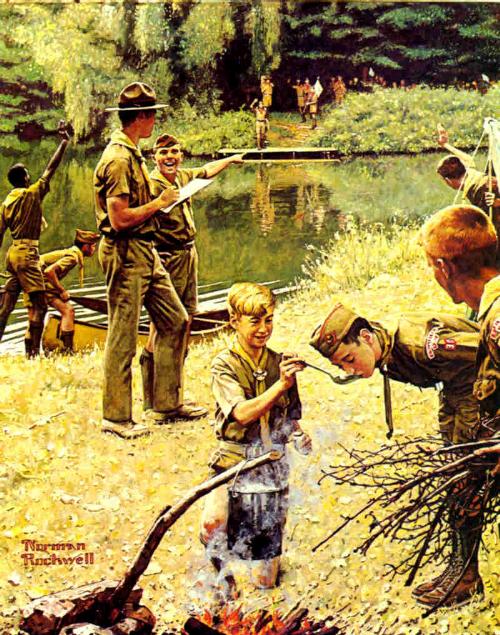 | A significant part of the Scouting experience is to get plenty of HANDS ON activity. From knot tying, to cooking on a fire and stove, to learning how to use a pocket knife or axe... Scouts "DO". In order to make sure everyone gets a chance to DO, boys are divided into smaller groups within the Troop so that everyone gets ample opportunity to participate. This is part of what the BSA calls, "The Patrol Method". Within a patrol-sized group, boys do not get "lost among the crowd" or feel as though their opinions (and votes) don't matter. Each plays a critical and important role in the Patrol's success. The definition of the "Patrol Method" from the National Council's website... Patrols are the building blocks of a Boy Scout troop. A patrol is a small group of boys who are similar in age, development, and interests. Working together as a team, patrol members share the responsibility for the patrol's success. They gain confidence by serving in positions of patrol leadership. All patrol members enjoy the friendship, sense of belonging, and achievements of the patrol and of each of its members.
| |  |  | |  |  |  |  |  |  |  |  | |  |  |  |  | | A Boy Scout troop leads itself. Adults are present to guide and ensure safety & compliance exists, but it is the YOUTH who make key decisions.
The Scouting program using The Patrol Method means the Troop members ELECT their own leaders; individual Patrol Leaders and a Senior Patrol Leader (SPL) who takes on "ownership" and hold the actual leadership position within the Troop. The SPL appoints an assistant scout (Assistant Senior Patrol Leader - ASPL) and various other leadership positions.
While serving as Senior Leaders, the SPL and ASPL cease to be members of their respective patrols and function as peers with the adult leadership. The SPL and ASP execute Program decisions, lead the meetings, plan agendas, pick camping destinations, and LEAD BY EXAMPLE when executing the agenda that the boys themselves created and agreed to follow.
Patrol Leaders are responsible for the well being and actions of their individual patrol and will REPRESENT their patrol in the Patrol Leaders Council (PLC).
At the PLC meeting (chaired by the SPL and monitored by the Scoutmaster or Assistant Scoutmaster), Patrol Leaders plan future trips and troop meetings. Through a model of Representative Government, they CHOOSE the trips and activities THEY want to do, and appoint other scouts to serve as skill instructors, or lead games or other activities. Adult leadership keeps them on track with suggestions and advice, but the decisions are ultimately left to THE BOYS.
Once the future meetings/camping trips are planned, the SPL and Scoutmaster present the PLC's plans to the Troop Committee for review. The agenda is checked for issues such as necessary fund raising, unique equipment/skills, camp ground reservations, and is given an over-all inspection to confirm that trips are aligned with the purpose of the Scouting Program. If the plans are approved, and the weekly meetings are lead by the boys (as designed) unless the skill instruction needed is currently beyond the skill set of the Scouts, or relates to merit badge requirements, then adults will render assistance.
ADULTS are a RESOURCE for guidance and ensuring that things are done the "BSA way" for safety, youth development and general direction setting.
"Boy Leadership" really means the Troop is doing the things the BOYS THEMSELVES want to do, and in doing so, will develop the leadership, communication, problem resolution, and organizational skills that underscore why Scouts excel in all other areas of their lives. | |  |  | |  |  |  |  |  |  |  |  | |  |  |  |  | | Other than high-adventure bases like Philmont or Sea Base, where adults are required to be BSA Registered Leaders, there is nothing in the BSA Program that prevents parents or legal guardians from attending camping trips with their sons. The Guide to Safe Scouting says, "There are NO 'secret societies' in Scouting. An adult may attend any scout function with their son". THAT BEING SAID... there are some guidelines visiting parents are expected to follow. 1. Scoutings "Youth Protection" guidelines MUST be followed. Registered leaders can explain these to you if you are not already familiar with them. 2. Part of what your son is supposed to be experiencing at camp is becoming a functioning member of his patrol. Therefore, he WILL sleep with his patrol, eat with his patrol, do KP (Kitchen Patrol) duties with his patrol, and perform campfire skits with his patrol. You may watch and advise... but LET HIM "do". 3. Attending parents will eat, tent, and in all other ways, "function" among the attending adults. Expect to be "put to work" over the weekend. 4. Smoking, chewing tobacco, alcohol, profanity and the like are NOT welcome in Scouting. We expect (and at BSA camp grounds it is required) that you do not smoke at Scouting events. If you feel that you "must" smoke, you are expected to not be in view of any Scouts (our troop or other). 5. Do not expect your son to sleep in your tent. While it is "technically" allowed under BSA Youth Protection, it impedes his development as a self-reliant Scout and the cohesion of his Patrol. We STRONGLY discourage any attempts to bunk with your son. 6. Siblings are not welcome to remain at over night excursions, the only exception being 2nd Year WEBELOS scouts, who are actually encouraged to begin interacting with a Boy Scout troop (if our camping agenda is appropriate for WEBELOS-aged boys.). 7. Non-legal guardians (boy/girl friends of single parents) are not to remain over-night at camping excursions. 8. Adults who plan to attend camp MUST inform the Scoutmaster 1 week ahead of time (indicate attendance via email). | |  |  | |  |  |  |  |  |  |  |  | |  |  |  |  | 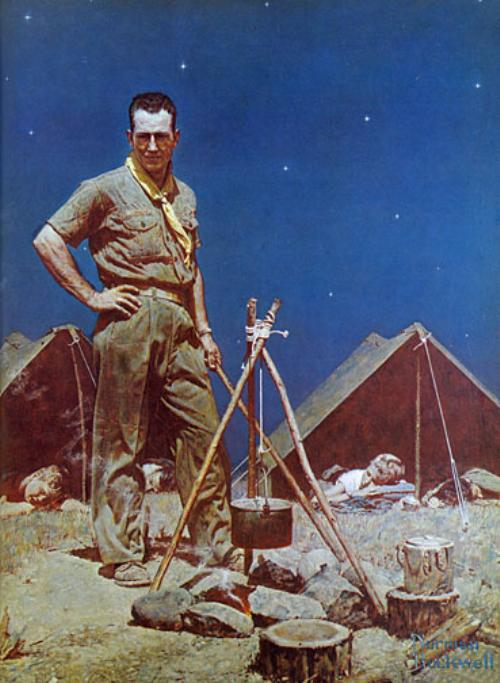 | After a Scout completes all the required tasks towards his next badge of rank, the next step is for the Scout to meet with the Scoutmaster for a "Scoutmaster's Conference".
The Scoutmaster's Conference SHOULD NEVER be a re-testing of any of his skills. Certifying his skills is the responsibility of the leader who "signed off" on his Handbook. Rather, the conference is a chance for the Scoutmaster to make sure all requirements are signed off, and then engage in a comfortable, yet detailed, discussion on how the Scout is feeling about the Program and how Scouting is fitting into his life as a whole. (This IS a character building program, if you didn't know.)
The Scoutmaster wants to hear from the Scout exactly what he likes, doesn't like, might want to do different, etc. He wants to know what his ambitions are in Scouting and "life". The ultimate goal is to make sure the Scouting experience is of real benefit to the Scout's development.
Once the Scoutmaster is convinced the Scout is ready to move forward toward the next rank, the Scoutmaster will direct the Scout to meet with members of the Committee, where a similar meeting will take place. This is known as a Board of Review. | |  |  | |  |  |  |  |  |  |  |  | |  |  |  |  | | Camping trips usually follow the following format.
Scouts will arrive at St. John's United Methodist church with their gear. Once all gear is packed and a final check for permission slips and medications is complete, we will depart for the selected camping destination. Upon arrival, the first order of business is to choose camp sites and set up tents. Once all tents are up, kitchen/cook areas are set up and all personal gear is stowed. Then, depending on the time, a meal will be prepared or the boys will have "Cracker Barrel" (snack).
Saturday mornings begin with the designated cooks waking up a little early to start preparing breakfast. Once this begins, the rest of the boys generally get up shortly thereafter. Each patrol may have their own dining area, or in the case of a shared pavillion, designated tables. Once KP is complete, there is a flag ceremony and then the Program portion of the day begins with a break for lunch around noon. Program (Scout-skill related activity, and/or the purpose of the camping trip) continues until 5 PM. After dinner, the flag is lowered ceremoniously and there is free time until the Council Fire (at dark). At the Council Fire, boys often perform skits, tell jokes, and enjoy snacks.
We generally sleep a little longer on Sunday. Again, cooks are up early to prepare breakfast. Cold breakfasts are encouraged, due to the faster KP time. After KP, all scouts are to gather personal gear and then start packing kitchen/dining areas. The tents are the last to be packed, as it is usually necessary to wait until the tents and ground cloths have dried completely. A tent put away wet will grow mildew and be ruined in a VERY short time. While waiting for tents to dry, the Troop is lead in a "Scouts' Own" prayer service, led by the Chaplain's Aid; a boy appointed by the SPL to lead religous events. Once all gear can be packed, camp is struck and we depart for home targetting a return home by around 12 Noon. | |  |  | |  |  |  |  |  |  |  |  | |  |  |  |  | 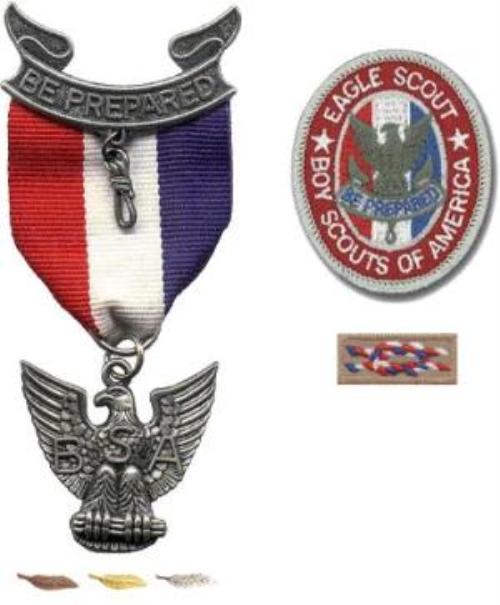
| Becoming an Eagle Scout is no small achievement. In fact, among adults who have gone on to become astronauts, doctors, politicians, or business leaders, most of them will say that earning their Eagle is clearly among the most important achievements in their lives.
Back to the question... WHY?
Look at it from this angle.... ADVANCEMENT is completely up to the individual Scout. If he has no desire or sense of committment to advance in rank, that is his choice. IT IS POSSIBLE for a boy to attend EVERY meeting and EVERY camping trip, and never make it through 1/2 of the available ranks if he isn't motivated enough to take the extra step of demonstrating skills or earning merit badges. Statistically speaking, only 2 out of 100 boys in Scouting will push themselves to become Eagle Scouts.
The "Trail to Eagle" is one of persistance, dedication, well-rounded learning experiences by earning 21+ merit badges, strong attendance at meetings and camping trips, and hundreds of hours of community service.... all culminating with the planning and complete exectution of his "Eagle Project" before his 18th birthday.
The "Eagle Project" is SO MUCH MORE than "giving something back to the community" (which it is, and let's not minimize the importance of community and charity). It is actually his "final exam" in Scouting.
HE manages his Eagle Project. He will put to use all of the lessons he learned as a Boy Scout; communicating, organizing, recruiting, conceiving an idea, selling the idea, planning the work, assigning work details to those helping him, being the "accountant" that tracks the hours worked and the money spent, etc. In every conceivable way, HE is the "project leader".
THESE are the highly desirable skills and traits that make "Eagle Scouts" stand out on a job resume or college application, and the fact that such skills and moral foundations are learned/mastered before "society" recognizes him as an "adult"... simply amazing! | |  |  | |  |  |  |  |  |  |  |  | |  |  |  |  | | After a Scout completes his Scoutmaster Conference, he is to appear for a Board of Review. Amazingly, it functions just like a job or private high school interview (this is not by accident) where the Scout will basically be addressing 2 specific topics: - How is the Program (including adult leaders) running, and is there anything the Committee should/need to do to make the Program better?
- Why does the Scout feel as though he has earned his rank and is ready to move forward to the next rank?
There will be several questions put to the Scout by 3 to 5 Committee members comprising the Board, but ultimately, the 2 questions above are what is being addressed. For example, a Scout will not be asked to tie a square knot, but may be asked "which knot was the hardest, and how did you get yourself to finally learn it?" Like a job interview, the Scout MUST come properly dressed; wearing the full (clean and presentable) BSA Field Uniform. After meeting with the Scout, the Board will debate, and if they are in unanimous agreement, will allow the rank advancement to be recognized. | |  |  | |  |  |  |  |  |  |  |  | |  |  |  |  | | Scouting's founder, Lord Baden Powell realized long ago, that when people look the same (uniform), they not only show they are members of an organization, but being dressed the same ERASES all trace of "class" or "wealth" or "social status".
In Scouting, all are equal and treat each other with respect. In doing so, we learn to look past class, income, race, religion, nationality, and social status.
Despite the attacks from some of Scouting's detractors, there has never been a program so OPEN and SUPPORTIVE of diversity as Scouting.
Considering this was taken into account in 1907, Lord Baden Powell was clearly a man ahead of his time. | |  |  | |  |  |  |  |  |  |  |  | |  |  |  |  | | Yes... it probably would. But why would we want that? This is BOY SCOUTS... not "fathers getting away for the weekend" Scouts... nor is it "WEBELOS 3" where adults are in the leadership role as in the Cub Scout program. This is where boys LEARN and DEVELOP their leadership skills so they can become capable young men. We DON'T EXPECT them to be the most efficient and organized leaders (and neither should you). This is their learning ground. Here is where we want the "mistakes" to happen, so they can learn from them. This is how we TEACH leadership skills instead of getting adults to "step in" because we could be "more efficient". Remember... the program is NOT DESIGNED to run perfectly. They may elect their "best friend" instead of the "most qualified"... and they will experience the consequences of casting a "careless vote". They may elect the Class Clown instead of the Class President... and NEED to "suffer" through a few months of a weaker or chaotic Program. Remember, NOTHING happens here by accident. Trust us. Trust the 100 year old program. Have faith. Keep your boy coming ESPECIALLY if he comes home with a few "complaints" on how things are being done. Ask him what he would do differently or what he did to try to correct what appears to be a "screwed up" situation. HERE is where the Program really shows its value. NOW you know... "bigger things" are happening here at Troop 340 than meets the eye. | |
|
|
 |
 |
|
 |
 |
 |
 |
|
|
|
|
|
|
|
|
|